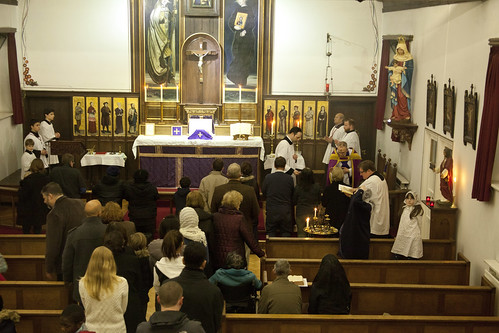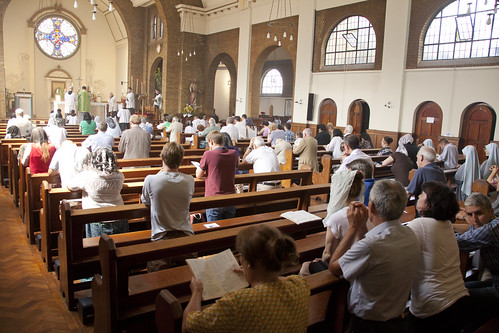 |
| A congregation with a healthy sex-ratio: the Traditional Mass on Ash Wednesday in SS Gregory & Augustine's, Oxford |
Surveys have long shown women lead more active lives of faith than men, and that millennials are less interested than earlier generations. One in three now claim no religious identity.
What may be new is that more women, generation by generation, are moving in the direction of men -- away from faith, religious commitment, even away from vaguely spiritual views like "a deep sense of wonder about the universe," according to some surveys.
What is fascinating is that the NCR doesn't deny the obvious - that today women are by every measure more religious than men, and found in greater numbers in Catholic churches. But the only point they draw from this is how dreadful it is if women turn out to be 'moving in the direction of men'.
Do they present evidence that the ratio is diminishing as a result of a higher lapsation rate among women? Not a bit of it.
In 1974, CARA research found 46 percent of men and 45 percent of women considered themselves to be "strong Catholics." By 2012, both groups had dropped significantly on that question -- men to 24 percent and women to 30 percent.
Now, I am not disputing for one moment that a drop from 45% to 30%, among 'strong Catholic'-identifying women, is bad, but by what strange logic are we being asked to fixate on that and ignore the drop from 46% to 25% among men? Why is a lower lapsation rate among women the focus of this article, rather than the higher lapsation rate among men, or simply the dreadful overall lapsation rate?
The answer is: because they think they can use the lapsation of women as a stick to beat theological conservatism.
"In evangelical and even in some progressive parts of Christianity, women are getting very mixed signals," Tickle said. "There is a view that a woman should be subordinate on Sunday, equal to men the five workdays of the week and Saturday is up for grabs. She's told at home and at church the man is to be the 'servant leader,' but then she goes to work where she has to be as tough as the guys to succeed." Tickle called it "religiously imposed schizophrenia. ..."
Yes that's right: women are leaving the Church in droves because they just can't stand the patriarchal teaching they hear from the pulpit. Haven't you so often heard offensively conservative sermons on the leadership of men in the family delivered in Novus Ordo Catholic parishes? Me neither.
Here's a question: is it possible that some women are fed up with going into churches where there are so few men, and into which their own menfolk are so reluctant to go? Might not that put them off eventually?
Last weekend there was a rather more sensible article on lapsation statistics in the Catholic Herald, by Stephen Bullivant, using statistics from the UK.
[W]ho are all these Catholic disaffiliates? It will surprise no one, I think, to learn that they are disproportionately men. Fully 41 per cent of male cradle Catholics, but only 24 per cent of female ones, now identify as having no religion. (Conversely, 32 per cent of female cradle Catholics, but only 21 per cent of male ones, are Catholics who attend church once a month or more.) One need not be patron of the Order of Malta to recognise a “man crisis” in figures like these.
Indeed not. But for liberals, these stark figures can only mean one thing: that the Church needs to make itself more attractive to women by ditching the Faith.
 |
| And another one: Sung EF Sunday Mass in St Bede's, Clapham Park, in London. |
I wonder whether women might benefit more, actually, from hearing patriarchal teaching. The clergy's silence on the Church's teachings on male headship are belied by the non-negotiable reality of the male priesthood, a very jarring contradiction of that silence which is experienced as incoherent and unjust. Hearing more about patriarchy might at least situate that teaching in a broader context.
ReplyDeleteI couldn't agree more.
DeleteThe same is true in relation to Altar girls.
So. For 40+ years in the US, Church teaching on marital matters has been suppressed, liturgical practice has been loosey-goosey, and--in general--we're not told that there is a Hell.
ReplyDeleteIs it just possible that THESE facts are behind the reduction in "strong" Catholics?